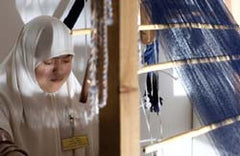Atfaluna Crafts
 Location: Gaza Strip
Location: Gaza Strip
Beneficiaries: 450 hearing-impaired women and men

Atfaluna Crafts is an income-generation project of Atfaluna Society for Deaf Children (estab. 1992), the only institution in the Gaza Strip that is devoted to education and services of people with hearing disabilities.
Atfaluna Crafts was born out of the need for vocational training for hearing-impaired adults. The participants themselves decided to turn the vocational program into an income-generation project, run primarily by deaf adults to produce and market quality Palestinian crafts, home accessories and furniture.
Today, the project encompasses a number of workshops, including wood carpentry, ceramics, embroidery and sewing, painting, and weaving. In addition to the Crafts employees, the project provides an income for over 250 women who work from home to produce the embroideries.
View our product range from Atfaluna Crafts here >>
These products are certified Fair Trade: creating opportunities for disadvantaged producers, sustaining fair working conditions and wages, empowering women, and preserving traditional crafts and artisan skills.
Cross-stitch embroidery in Palestine
Once a traditional craft practiced by village women, Palestinian cross-stitch embroidery has become an important symbol of Palestinian culture. Embroidered pieces can be found in the homes of most Palestinian families in the West Bank, Gaza Strip, Israel and the Diaspora beyond, adorning the walls of houses in Jerusalem, villas in the Gulf, suburban homes in the United States, and cement block houses in refugee camps. In addition, cross-stitch embroidery is given as gifts and worn by Palestinians worldwide on festive occasions.
The popularity of embroidery springs from both its beauty and its association with the Palestine of the past. Common patterns reflect the millennia-long history of the land. The designs are derived from sources as diverse as ancient mythology and foreign occupations and date as far back as the Canaanites, who lived in the area over three thousand years ago.
The handicraft also symbolises the traditional rural lifestyle of Palestine, much of which was lost after the 1948 creation of the state of Israel. Embroidery was the principal decoration of rural women's clothing. It was part of a village women's daily routine and a means of showing off her personal skills and social identity. The patterns, colours and quality of the dress reflected a woman's social standing, marital status and wealth.
Although the Palestinian cultural landscape has changed dramatically in the last fifty years, cross-stitch embroidery has remained a vibrant handicraft because, for many Palestinians, it is a familiar reminder of Palestine in the days of their grandparents or great-grandparents.
